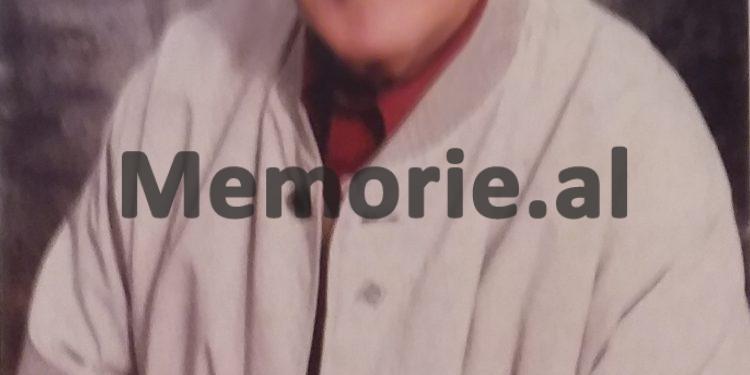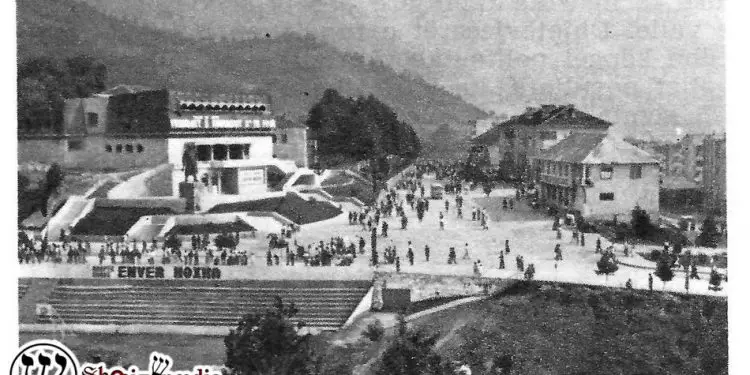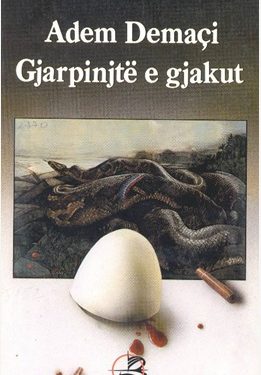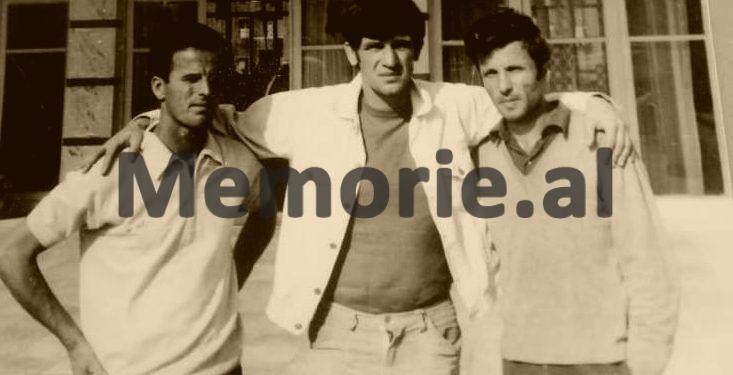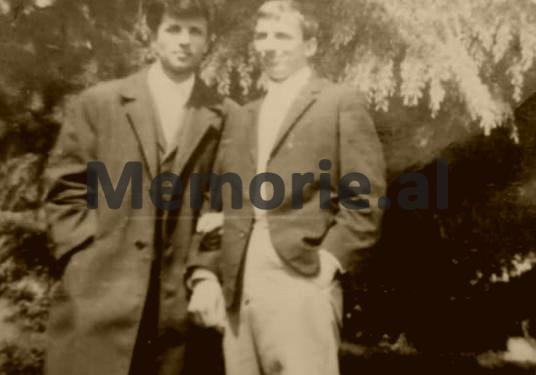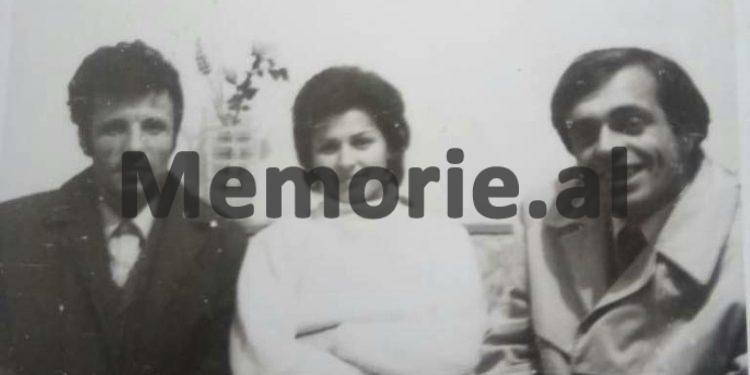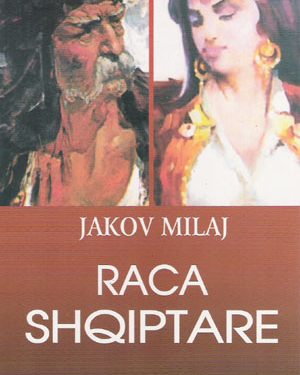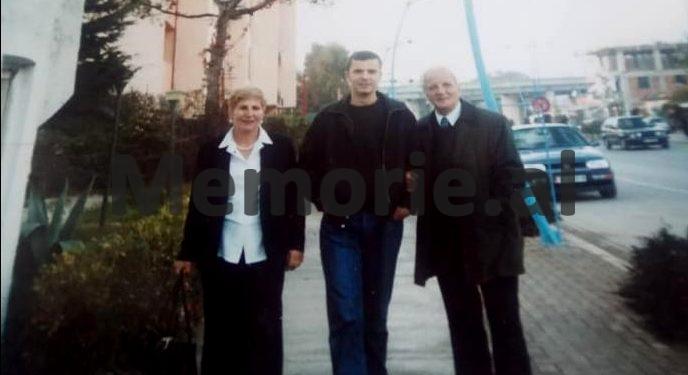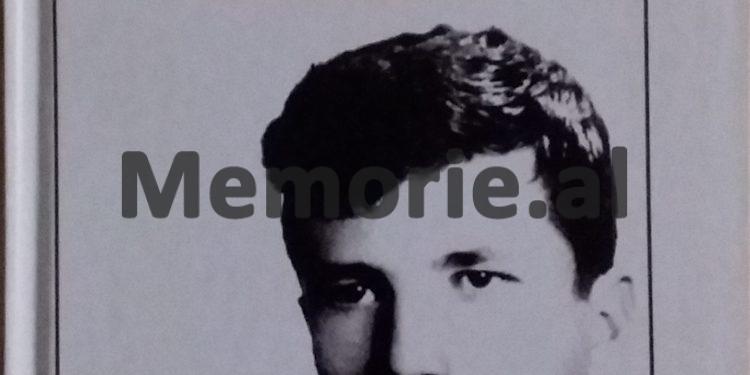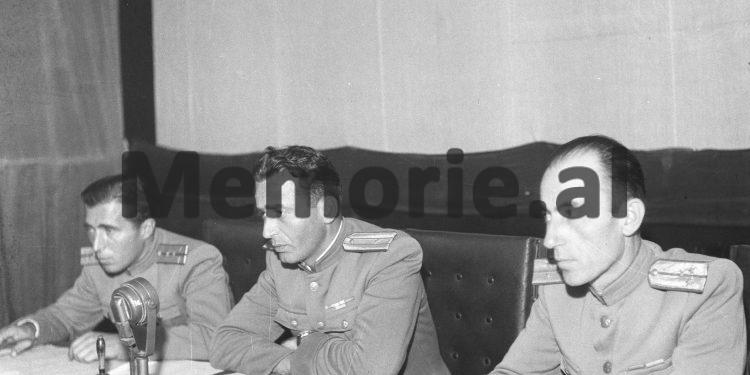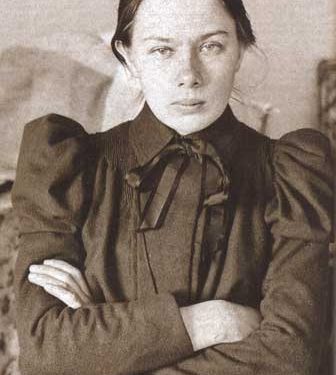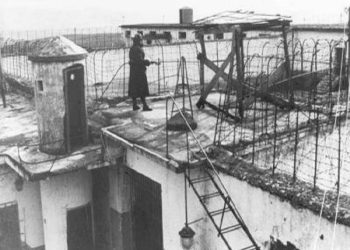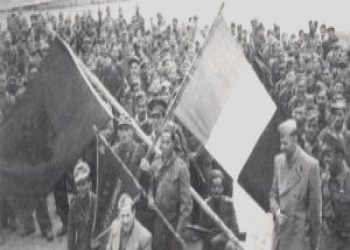Nga Esat Myftari
Memorie.al publishes the unknown story of Esat Myftari, originally from Peja, who was in the high school benches when he was a member of a group of young boys who opposed the official Belgrade policy against the discriminatory policy against the Albanian population living in He started working as a journalist at “Rilindja” in Prishtina, from where he was proposed as a correspondent of the TANJUG Agency, but he refused and in 1963 he was forced to flee and come to Albania, with the intention of seeking help and support. from the mother country, for the clandestine organization of the “Boys of Peja”. Numerous vicissitudes in the mother country and continuous pursuit of the State Security since the time of studies in Tirana and the period when he served as an educator in the town of Shengjin and the villages of the Coast of Matë, where he was arrested in 1975, after he had officially requested repatriation to his homeland Kosovo, sentencing him to ten years in prison on charges of “agitation and prop agenda ”, which he suffered in the Spaç camp. The whole painful story of the journalist, publicist, researcher, translator, MP and diplomat, Esat Myftari, is described with a literary mastery in his book, “Your death, my life” an autobiographical novel that has just come out from the Publishing House “Lena Graphic Desing” of Prishtina, and with the permission of the author, will be published in parts by Memorie.al
The unknown story of journalist, publicist and writer Esat Myftari
Esat Myftari was born on June 16, 1940, in the city of Peja in Kosovo, where his family originally came from. He completed his first elementary school education, 7-year-old and high school, in his hometown, completing them in 1959. Also, in 1959, Esat, a 19-year-old boy, began his studies at the Faculty of Law of the University of Belgrade. In love with history and literature, he started writing at a young age when he was in the 7-year school benches and in the faculty period, he became a member of the Literary Club “Përpjekja” based in the Student City of “New Belgrade”. , where he affirms himself quickly and from time to time, writes poems and critical literary views, but due to their content, does not send them for publication.
In 1961, after successfully passing the relevant competition, Esat started working as a journalist in the daily of the province of Kosovo, “Rilindja”, where he is assigned to cover the chronicle of the city of Pristina and the Kosovo Trade Unions. In the same year, he was offered a qualification scholarship at the Yugoslav Agency “TANJUG”, with the prospect of becoming a correspondent outside the Yugoslavia of that time. But his joy at the qualifying scholarship that was destined to send him abroad was quickly dashed, as the specialization offered to him was conditional on his membership in the Communist League of Serbia, which 20-year-old Esat refused. categorically.
Meanwhile, in 1963, he participated in a group of young men who disagreed and were against the policy pursued by official Belgrade towards the Kosovo Albanians and wherever they were in their lands under Yugoslavia, and on behalf of the “Peja Clandestine Group”. , as their representative, crosses the border illegally and comes to Albania. Esat’s goal as a representative of the “Illegal group of boys of Peja”, was to establish contacts with the Albanian state and to seek various support and assistance for the well-functioning of that group of young boys, which aimed to resist the discriminatory policy of official Belgrade to the Albanian population in Yugoslavia.
In 1974, some members of this group were arrested by the official authorities of the Yugoslav Ministry of Internal Affairs, accused of participating in the events of 1964, when the Albanian national flags were unfurled in the main cities of Kosovo and when they were taken strict police and judicial measures against them. The main motto of this mass movement, which was the first of its kind in post-war Kosovo, was the unification of Albanian lands with their “mother” state, Albania.
Meanwhile, Esati, who was in Albania, as well as some of his Kosovar emigrant compatriots in Albania, gained a right to study and in 1965, he began his studies at the Faculty of Natural Sciences in Tirana, in the “Bio-Chemistry” branch. After the third year of studies, disappointed by the official policy of the communist regime of Enver Hoxha and the treatment of Kosovar emigrants in Albania, who upon their arrival in their homeland, it seemed that “the rain was heavy in the hail”, interrupts his studies and requests repatriation!
Of course, this was not approved by official Tirana and in 1969, Esat started working as a teacher in the 8-year school in the town of Shengjin, in the district of Lezha, where he worked until 1974, from where he was transferred to the village of Tale. of the Mata Coast, where he also worked diligently. As during the whole period, he was working and living in the district of Lezha, Esat was regularly monitored by all means by the State Security organs, even in the school where it was said that he had been sent on purpose, because they were afraid of an escape. his opportunity to go to Yugoslavia from Shengjin, he is arrested and sentenced to 10 years in prison, accused of “agitation and propaganda against the popular power”!
After serving his full sentence while serving his sentence in the Spaç camp, etc. (not benefiting from any day of reduced sentence), Esat was released from political prison in 1985 and returned to the district of Lezha where he had worked and lived before the sentence and in 1986 , starts working as a worker in the Paper Factory in Lezha. That same year he started a family and then two sons were born.
In 1990, at the beginning of pluralism, Esat took an active part in the popular movements for the overthrow of the communist dictatorship in Albania and with the establishment of the branch of the Democratic Party for the district of Lezha, at the beginning of 1991, for his past and contribution. great at the beginning of those popular protests, he is elected secretary of that branch.
Also, as a result of that contribution, in the first pluralist elections of March 22, 1991, Esat was elected a member of the Democratic Party in the People’s Assembly, representing the voters of the Mata Coast, where he had worked as a teacher until the day of his arrest in 1975.
A year later, in the autumn of 1992, he was appointed Director of the Diaspora Directorate at the Ministry of Foreign Affairs of Albania, headed by the Minister, Alfred Serreqi. In that position, Esat worked diligently until 2000, when he was appointed diplomat at the Albanian Embassy in Riyadh, where he remained until his retirement.
Since that time, Esat has been devoted to his passion, writing, studies and translations and since 2011, he has started publishing several books, which have been welcomed by critics and readers, also because of their subject matter, as well as the variant of Gegërisht that he wrote them, which is very rare in Albanian publications of the mother country!
The first book published by Esat Myftari is “Emrush Myftari” (monograph), followed by: “Kosovo and Enver Hoxha” (study), “Political profile of Esat Mekuli” (monograph)
As well as “Your death, my life”, which is an autobiographical novel, where he has masterfully and chronologically described most of his life, from family and life in Kosovo as a high school student, escape to Albania , numerous vicissitudes from State Security surveillance and persecution, arrest, investigation, trial and deportation to Spaç prison.
All the events and everything described in the book “Your death, my life”, are real and the characters there are presented with their concrete names and surnames, while only those people who badly affected his life, (mainly, those of bodies of the Ministry of Internal Affairs of that time, such as operatives, investigators, police officers, heads of the Ministry of Internal Affairs and the Branch of Internal Affairs of Tropoja, Lezha, witnesses in his trial, etc.), the author was has only changed the names, giving them their real surnames.
Continued from the previous issue
Excerpts from the book “Your death, my life”, author, Esat Myftari
Debate with the major on Russian literature and Krupskaya plagiarism
“Nice,” cried Ridvani.
As he filled out the form for the other parts, the major closed the file and offered Ridvan a cigarette. He took it willingly and asked:
– Tarabosh?
– No, “Partizani”, because it is better – said the major.
As he was about to leave, Ridvan asked if he could have the “Voice” of the day and a book until they came to Tirana to take it. The major promised that he would have the books tomorrow and the “Voice” in a few minutes.
Ridvani could hardly bear to open the newspaper for which he had heard so much and for the articles he had heard from time to time on “Radio Tirana”. He was surprised by the large format of the newspaper that resembled that of “Le monde”, but he could not believe his eyes when he saw that it had no more than four pages, while his “Renaissance” had gone to sixteen pages… He placed the newspaper on the table and began to look at its column by column to see the structure and division of the columns. The first thing he noticed was the lack of portraits of the protagonists of international politics as well as its reflection on the last page. It did not take him many minutes to realize that the differences were great in both design and content, and that he would miss the press he had grown up with as a child.
The next day, the major came to the room with three books in his hand and put them on the table.
– You asked for it, you brought it! – he said.
“Thank you very much,” Ridavni replied.
The books were: “Brave Sergeant, Vollodja”, “Youth Education” and “Empriocriticism”. Since Krupskaja’s book was the thinnest and recently republished, he opened the first one. But when he read the Latin saying at the top of the page “sound mind in sound body”, as saying of Krupskaja, he exclaimed:
– Oh, no, this is a Latin saying!
The Major revolted.
– What do you say, ore! The plagiarized Krupska?!
– I did not say that it is so, but I think it will be a translator slip!
– Impossible!
– So at least I know – Ridvani said softly.
– What about “Zeri”, what did it look like?
– Strong newspaper – said Ridvani.
– Necessarily, is a body of the Party.
– But with a few sheets.
– Of course, because we save. Do not look at the Yugoslavs who are subsidized by the West. We do everything on our own.
– But you are free! said Ridvani, sure he would please the major.
Four days later a large “Jeep” came from Tirana, suitable for mountain roads and took the border trespasser named Ridvan Myftari, the third Kosovar who thought of moving a mountain with his narrow chest and no muscles. we also developed.
CONCLUSIONS
On the morning of one July day, the guard informed Ridvani that in a few hours the conclusions of several months of negotiations would be reached. He was also informed that the “great” would also participate, a term that in those conditions said a lot and whose words would have the weight of a seal. Ridvan was overwhelmed by the gallantry, because those seven months of intense conversation had exhausted him well. Not only was he gaining weight, but he was also losing his zeal and mental freshness. More and more I was stopping to re-read the texts and to ask questions frequently, because unlike the first days, now their reactions were missing. Above all, they are no longer aware of developments in Kosovo.
Only once did he have a great victory (at least that is how Ridvani perceived him!) When he saw in the newspaper “Zeri” his materials published on the fourth page and which was broadcast twice a day: in the morning and in the evening. The article compiled by the well-known journalist Javer Malo, of course to be mixed with another episode, but this was done just to lose track. Lieutenant Colonel Sakipi himself came to visit him the next morning and told him that the article had a great echo and that that evening the streets of Peja were empty at the time of transmission of the text. More than for himself, Ridvani
was warmed by the fact that his friends would understand that their concerns had found understanding in Tirana. Therefore, the end was crowned with a not insignificant success.
Around ten o’clock they came in two cars: in a “Jeep”, where the lower rank was to be, and in a car with paint and curtains to be released on the windows with the “big one” and the lieutenant colonel. With them hearing the noise of cars, Ridvan approached the window and cast his curious gaze from behind the curtains of the room. They came down quietly and somewhat disinterestedly, without exchanging words between them. The guard slowly opened the door of the room and ordered him to wait there, because that was what the protocol wanted. Ridvani shook his head at the assertion and realized that his writings were not a game, that a state was taken with them, otherwise the commitment of so many people and our spending of that money for his cause could not be explained.
Talks in Tirana with major military officials about the situation in Yugoslavia
The newcomers greeted him warmly. Lieutenant Colonel Sakipi even took advantage of the moment and slightly violated his goal, as if he wanted to say: you have me here! The “big man,” whom the guard had assumed to be a general, was a stocky man, with a crooked nose, dark skin and very mobile eyes, and who appeared, in a certain hand, as the minister’s deputy.
They sat around the big table in the five chairs they had prepared beforehand. On them was laid a thick cloth with paint fluff, and in the middle a Chinese porcelain vase, with a bunch of yellow rose, snapped on the bark in front of the porch. Apart from the “big one”, Ridvani knew the others well, at least in person, that they, each in his own way and for certain lands, came from time to time to deal with their editing, before printing them in typewriter.
The wet Ridvan and the four superiors with thinning or half-bleached hair, looked like in an unusual council meeting, where they would discuss any complex problem. They made Ridvan a special place in front of the “big one”. Judging by this decision, it seemed that the main conversation would take place only between him and him. His companions, including the lieutenant colonel, gathered between their shoulders and were listening in silence. Ridvani had rarely met to participate in such meetings of superiors in Pristina, of course as an initial journalist, so without active participation. But, even when very serious topics were dealt with there, you seldom had light and careless interventions to lighten the atmosphere, and here everything was taking place in some strange order and hyper-discipline.
– I have read your materials carefully, the “big one” started, and we are generally satisfied and grateful for them. You gave a panoramic but also analytical and updated overview of the situation in Kosovo and Yugoslavia. Furthermore, you have correctly explained some things that we were not very clear about. Probably as few of the Kosovar emigrants. We appreciate above all your seriousness and sincerity, behind which is hidden your work and dedication. I believe that my colleagues who are here will have conveyed, as the case may be, our assessments. They nodded in affirmation, some even laughing heartily. But, of course, he continued, we also have some remarks that I will express today in the most benevolent but also open way. First, from an organizational point of view: the forms you are talking about seem a little archaic and effortless.
Secondly, from the point of view of assessing the situation, you make our war very close and necessary. So, in general, there is an alarm that seems to us unargued! But do you know what that means? In short: to set fire to both Kosovo and Albania! Third, I would say that there is also a lack of study of the international circumstances we are going through. You understand, I believe, that we are now entering a new era!
Ridvani did not expect these remarks so late, no matter how true they were. I stirred them inside, looked at the other officers around the table, but did not notice any occasional emotion on their faces. No muscle was moving. They looked like poker players! Even the lieutenant colonel had lowered his gaze on his hairy palms and was not making wine by mouth. Ridvan then took heart and returned the cartridge:
– Therefore, we did not take material action without consulting you. I’m talking about the time I was there. But we deserved some news from you since we had sent two people at different times for this purpose.
Ridvan’s disappointment…?!
Instead of answering, he released the second fly:
– Were you sure you did not have infiltrations?
“I do not put my hand in the fire,” Ridvani replied without intonation. But if you were aware, you should have let us know.
– Suspicion is the first requirement of security – returned the “big” with light gas on the edge. But we are talking about probability, not about concrete people. There is something else: in your writings, you have mastered as much as the fact that your group, for the most part, consists of people with parents or relatives shot. Does this smell of sectarianism?
“No,” said Ridvani, “because there was no such condition.” On the other hand, as you know, everything is done on a voluntary basis.
– Were these parents shot, were they collaborators with the Germans? I am not necessarily talking about the punishment units, but as recruitment through the lists, even if they are dead.
Ridvani was not believing his ears. Why did he come today? To relativize prisons in Kosovo? He realized that he had to answer bluntly:
– They were shot not because they were with the Germans, but because they were for Albanian Kosovo!
The “big one” was sour on the face.
– What about the literature you use, is it questionable? – he continued with the series of attacks.
– I think not. On the contrary, it is a literature that we lacked. With their facts and formulations, we have approached the people and opposed the invading Serbs. We are not divided badly. I speak of our judgment and taste there. We loved those books so much that we memorized fragments of them.
– But the authors that you consider as favorites of tradition, I saw the list you had made, we have gone through lawsuits and they have served their sentences. – he said and laughed louder, as if he was exhaling a list of pleasure from his chest.
– Maybe, but we did not know! Ridvani said dryly.
-To believe and understand! How much they liked “Albanian Race” and “Kosovo – the cradle of Albanianism”. But, do not be sorry, they were pieces of racists, under the influence of German ideology!
Ridvani was getting chills on his back.
– I read in “Zeri”, yesterday’s comment on the arrests in Kosovo – said Ridvani, more as a counterpoint.
– They were four of your friends, weren’t they?
– Yes, four, as it was said there!
“We were not surprised at all, although we had some hope that the dimensions would not be like that,” he explained.
“Neither do I,” said Ridvani.
“But in fact,” continued the “great”, “it could not be otherwise, because the massive and wild manifestations have their price.” It was the first time that Kosovo inaugurated such a collective reaction and bravely supported it in the courtrooms. For this they, your friends, deserve congratulations and it was a colossal success for all of us. Those trials caused a great deal of controversy throughout Kosovo. But public opinion is divided: one side thinks that due to lack of experience they have fallen into the trap of the Yugoslav secret services; the other side thinks that in their organization and direction our organs had a finger and that after their discovery we left them in the mud. But according to our analysis – if we say this without gloves – a good part of the mistake actually belongs to you, because you have exposed yourself as much, as you have stated in one of your writings. However, the most beautiful thing about these trials has been the bravery and open defense of the cause by the defendants. In addition, a great political success should be noted: the emergence of Adem Demaçi as the central figure of this whole movement, which means that now and then the movement has a leader. In all revolutionary theories the crystallization of a leader marks the starting point of success. Of course, these are impressions that come from the press there and that coincide with our sources. Agreed?
Conversation about Adem Demaçi and his novel, “Blood Snakes”
– Apart from his novel, “Blood Snakes”, I do not know Adem personally. As for our weaknesses, I think they were inevitable, but, I repeat, if it had been quick intervention, some things might have been saved. By the way, to date I have not received any answer from you to the question of how the liaison work went through with the slogans stored here.
After this last part belonged to Lieutenant Colonel Sakip, he addressed Ridvan:
– Undoubtedly the request has been sent to the country.
But there was no certainty in the lieutenant colonel’s voice, which did not escape Ridvan without noticing him.
“The great”, out of the desire not to prolong this discussion further, ask the next question even more strange and tactless:
– In your opinion, how should we act now and then with your group?
Ridvani, with his shoulders slightly loosened, replied slowly and grimly:
– As you can see, I am already out of developments.
– I look a little upset, but this is how it works, dear Ridvan. True, a period of rest and re-consolidation may follow, but I think you will never be out of such developments again. Your whole life will be in the sign of these events. During this vacation you will certainly go for studies for your further training, but again, one day, you will be needed for Kosovo. This is our collective opinion.
– I hoped otherwise! – Ridvani said almost in a low voice.
– The war will be long and we must not get tired. Oh, how many such situations we had during the war, but never bowed to and won over external and internal enemies.
With this somewhat raping comparison, Ridvan realized that he had no choice but to return to his shell. He had never thought this would happen so quickly. He saw that they had run out of supplies and that the upheaval that had taken place in Kosovo led him to a new path, unexplored and still unlit. He had remembered that he was the master of his own reserve, but, from now on, he was told clearly and brutally, that it belonged to the operative urchins that would be changed according to cyclical needs and that everything with those materials would be done behind his back, completely without his knowledge. But he realized something else, unimaginable and very hurtful: that within the group of officers and other officials who had dealt directly or indirectly, behind the curtain, during the seven or eight months of their stay there, the provincial mosaic had been present. and not at all religious in relation to it.
The conversation ended with this cold litany. The officers were taken one by one and left the room with regret for the condition of this Kosovar boy who was watching the heartbreaking end of his utopia, which he was showing with us his appearance.
Of course, no one wanted to be in his shoes.
After about three hours, in the premises of the villa, Lieutenant Colonel Sakipi laid a prosperous lunch in honor of his speedy departure and the closure of these conversations. They were alone. The lieutenant colonel was setting the table himself; he did not let the villa guard help him either. Today Ridvani is my exclusive guest, he told her. Ridvani, on the other hand, was standing on stilts: he was still not agreeing with the fact that throughout the conversation at the table, he had not intervened with any softening or correcting words towards the elder.
When they were laid out at the table, the lieutenant colonel told the guard to go to his room and appear only when lunch was over. He himself had turned on the radio and chosen a symphony because, as he said, “her music is diffuse, so it softly fills the space, but also closes many holes, even the very small ones”.
He laughed bitterly and suddenly exclaimed:
– Welcome to us, Peja!
– Good to find you, Plava!
I ground the glasses with the red vein.
– I especially liked you today. You were prudent, accurate and, loyalty, brave!
– Thank you, but none of you said anything.
– In order not to scrutinize these works, I am quoting the definition of a French biographer for Demosthenes. He says: Demosthenes was great when he learned to speak, but he became insurmountable when he learned silently!
Ridvan instantly got the allusion. The whole being was sent for a consolation, so, without realizing it, he grabbed the glass of the vein and dried it at the end grapes rubbed his lips a little, but quickly wiped them with pizza, but inside he felt a great release and a kind of retribution for the insults of the negotiating table. Lunch went on for a while – the glasses were full emptied two or three more times, but then fell over and Ridvan snapped like a sack over the table.
When he fell asleep late at night, he saw that he was in bed and that his mouth smelled of sourness. Near the bed without the guard sat in the chair that was sitting on his head, with a worried face.
– What happens next? – Ridvani asked and Zani came out of the scratch.
– Drink a lot.
– Did I make any unpleasant gestures?
– No, they did not make gestures, but they talked a lot!
– I spoke?!
– Like an orator!
– And why did I speak?
– I do not know, I was in the other room.
– Nothing, nothing caught your ear?
– I only remember that you repeated two or three times in a loud voice: you do not love Kosovo!
– Aha – he did Ridvani.
-Don’t worry, in the end you were only with lint colonies.
– This is the second time he has lost himself in drinking. This happened to me once again in Peja at the wedding of a cousin, but then it was my uncle’s fault that he insisted that I accompany him.
– Then, if I were in your place, I would never have put alcohol in my mouth! he advised.
– You are right – admitted Ridvani – Never! /Memorie.al
Continues tomorrow




